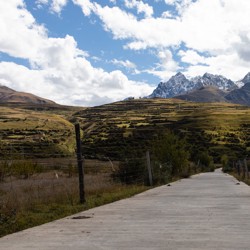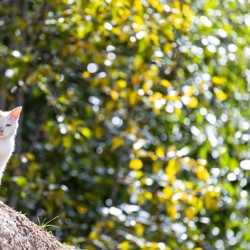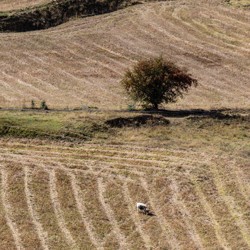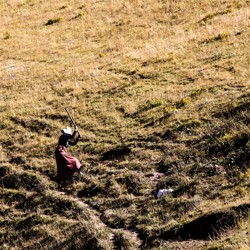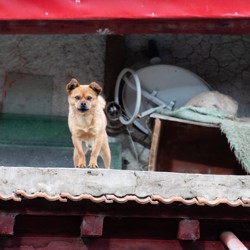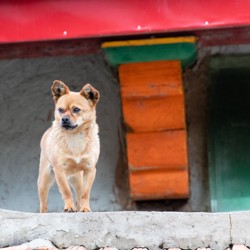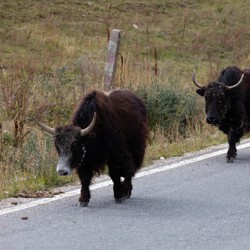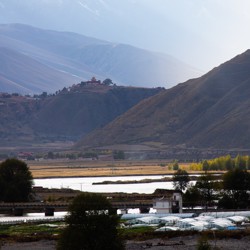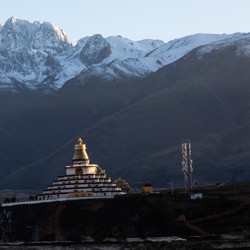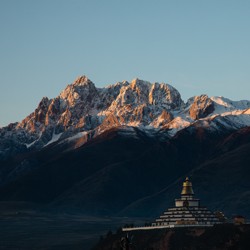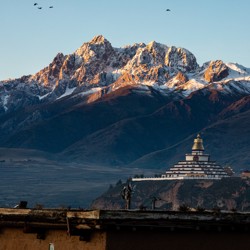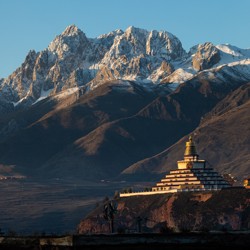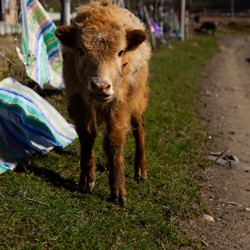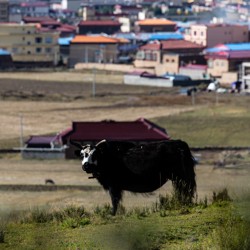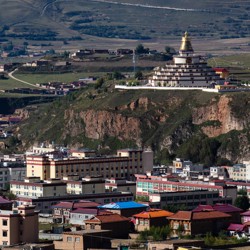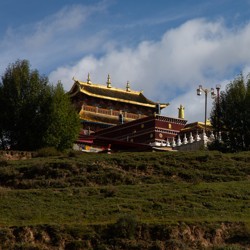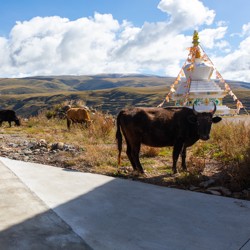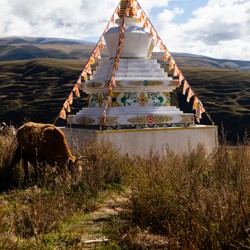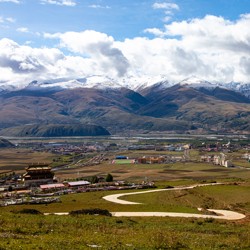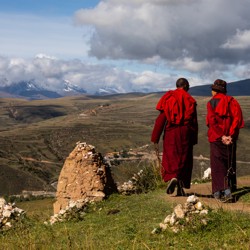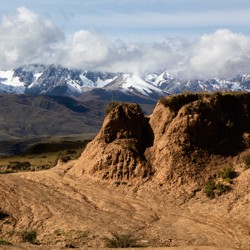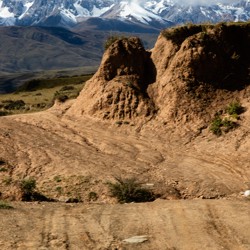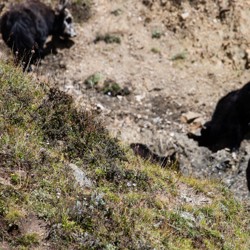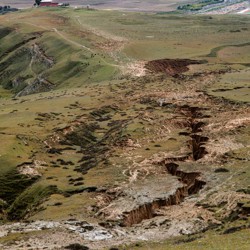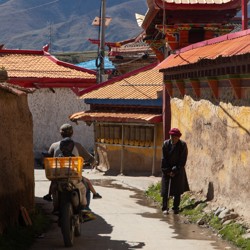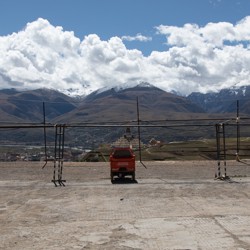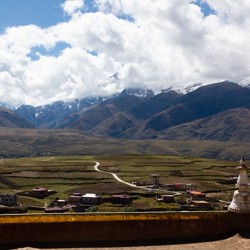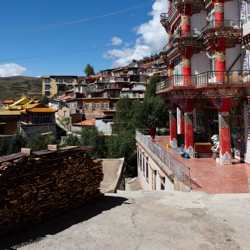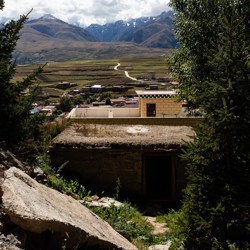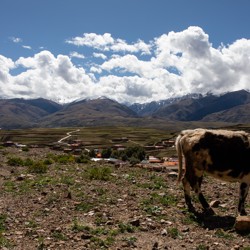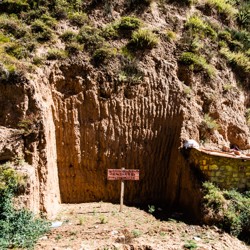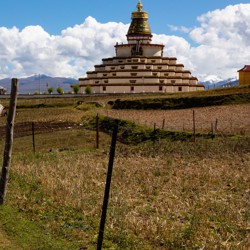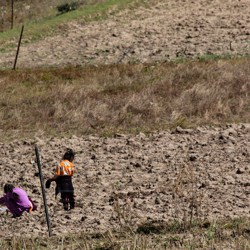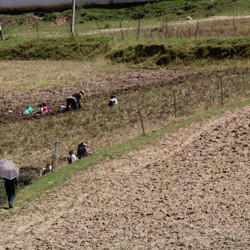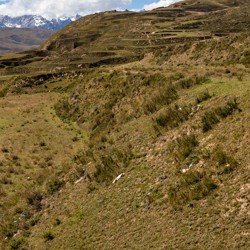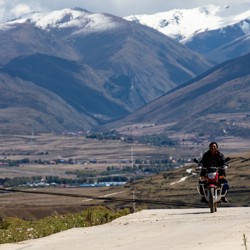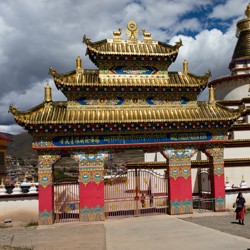02. October 2019
Ganzi

The bus to Ganzi was scheduled to leave at 5:30am, so I had to leave the hostel quite early in the morning. With some delay the bus finally left the bus station at 6am - only to stop after around 2 kilometers to have a break for one and a half hours. I don’t know why the break was necessary - maybe the bus driver was just waiting for sunrise - but it’s not the first time that happened to me while taking a long distance bus in China. Still it would have been much nicer if the bus would just have left two hours later instead.
On the way to Ganzi we passed three police stops and as a foreigner this is always a hassle. While the Chinese or Tibetan travellers have just to present their ID cards, as a foreigner you are registered differently. Sometimes just showing your passport and having your photo taken is enough, sometimes they require you to fill a form with the same data and sometimes they try to ask you questions. In the latter case it’s often helpful to not be able to speak Chinese - or at least pretend to - to only have to answer some basic questions, e.g. the country you are from.
For the long distances, a lunch stop is also mandatory. At these stops there is typically not more than a very simple restaurant with inflated prices and a shop selling instant noodles. Since I was not too fond of either, I just wandered around a bit. When I passed a monk and some nuns, travelling with the same bus as me, they invited me to their lunch, consisting of some bland brand, bamboo shoots and some other vegetables. Although I couldn’t really communicate with them, it felt to be impolite to decline this invitation and sat down with them.
Finally in the late afternoon we reached Ganzi and I found my way to the hostel recommended by the English translator in Kangding. And it was indeed a very nice place and cheap on top of that to. The owner greeted me and informed me, that unfortunately he could not promise that the showers would be available, since in the last two months this part of Ganzi had problems with their water pipes. A bit later in the evening a group of bicyclists arrived and then turned around after they got the same information. In the end, the water problems turned out to be resolved already the next day and so even hot showers were available - something not guaranteed in this part of China.
Since I was a bit worried about by left foot and feared that it might be one of the tendons causing the problems, I decided that this place was great to hang out a few days and also get the internet finally running. Apparently due to the National Day and more specifically due to the 70th anniversary of the People’s Republic of China the Great Firewall has been hardened and almost all of the popular VPNs either did not work at all or had problems most of the time. My travel SIM also did not work with my phone - even after contacting the support several times, but at least it worked on my notebook using Windows (unfortunately there are no drivers for Linux). After unsuccessfully trying out several VPN providers, I finally set up a virtual machine under Windows to be able to continue my work. Now I was able to finish my side project and also push my first update to this blog!
After the first rest day I planned to do a short hike on the second day to check whether my foot would still cause any problems. Before heading out, I talked a bit with two Swedish guys - a dad and his son - who were quite enthusiastic about hiking and not that fond of the political situation in China and Tibet. Since they had arrived here from the south (Yunnan) we talked a bit about our experiences hiking the Tiger Leaping Gorge and the kora in Yading.
The planned short hike got much longer than expected. First I just climbed up a small hill near the hostel, passed some Yaks, Cows and their (infertile) crossbreed and went up to a monastery. Since I did not feel tired and my foot was not causing any troubles, I decided to just walk a bit further and finally, after 20 kilometers I returned to Ganzi. Planning to buy a few supplies, I wandered through the city and was greeted by a Tibetan English teacher and his friend who had been in the restaurant of the hostel the previous evening. They invited me to come with them and at the home of the teacher we enjoyed some hot water and tea and talked a bit. It’s always a bit difficult to talk to some people you just met in these regions about political stuff, since you never know whether the people might be actually undercover agents by the Chinese police, so mostly I avoid directly stating my own opinions and instead asking them to describe their experiences. In this case they had somewhat different opinions: While the English teacher saw some benefits of the Chinese influence due to the improved infrastructure, his friend - ironically a Chinese teacher - was more skeptical.
The first impressions of the hostel even improved over the days I stayed there. Hostels are often a good place to meet other travellers and exchange some information and the better the reputation of the hostel the higher the chances are to meet fellow-minded backpackers. This place was no exception. Apart from the Swedish guys already mentioned I also met Elenore here, a photographer living in Shanghai, traveller and also engaged in helping women in this traditionally very male dominated country. Daniel arrived in this hostel as well, the only foreigner I met while climbing Emei Shan. At first I was not sure whether it was really him, having him met only briefly and he was not sure either, but after talking a bit it turned out it was really him. Some Israelis staying in the same hostel in Kangding - although not the ones I had dinner with - also arrived.
After I finally managed to finish my side project, I explored the area a bit more. I briefly visited the more than 500 years old monastery, went up a stupa and finally went to the hills again for another hike. Since it was National Day, the police was even more present than in the last days and just walking through the city and later on along some roads on my way back from the hills, I was stopped three times. Once my passport caused quite a bit of confusion, since the police officer spotted an old visa for China - back from 2012, when I lived in Singapore - and wondered why I, as a German, had a visa from Singapore. After that was finally cleared up, I was free to continue my walk.
Since Daniel wanted to head into the same direction as me for the next day, we decided to team up to try to find a bus to Manigango. In the evening he asked Nate, the hostel owner, about recommendations for accommodation for this village and Elenore joined the discussion as well. He was flabbergasted as he heard that basically to get a shower you have to pay a hotel room and that for cheap guesthouses typically not even a shared shower was available. Wondering what Tibetans would do about the missing shower, he received the simple answer: They don’t shower. And indeed, most Tibetans never take a shower and even bath very seldomly. Still I very rarely noticed them smelling badly. So, Elenore told him, he would have the choice to either pay around 200 Yuan for a room with shower or 40 Yuan for basic guesthouse.
Unfortunately one of my camera lenses started failing in Ganzi due to some problems with the contacts, so I might have to rely on the other ones.
